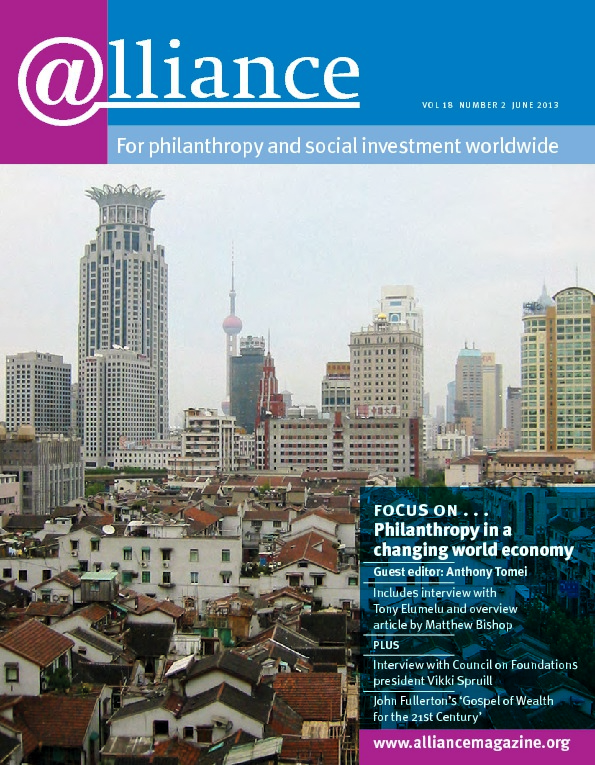The world’s large foundations have become a major source of capital for programmes addressing the world’s biggest social and environmental problems, including climate change. But the work of the philanthropic community to help address climate change is not yet enough. Without reform of our short-termist financial system, the foundations of the world risk finding all their other goals and achievements undermined.
Climate change can be seen as the mother of all philanthropic targets because it transcends all other issues. As climate change continues to accelerate, there will be more disease, more water issues, major food shortages, and increased social unrest caused by shrinking natural resources. As a result, the work done by foundations to address health, water, child poverty, food shortages and many related issues may rapidly unravel.
If this single issue has the power to derail all other efforts, are foundations tackling it in a way that is likely to make a difference or are these efforts merely patchwork projects that will require a repeat effort once climate change really kicks in?
This leads to the core question of how foundations are working to address the root cause of our continuing failure to address climate change: the incessant, unregulated flow of capital from the world’s largest institutions that currently guarantees the business-as-usual outcome that will turn climate threat into climate disaster. Despite the fact that over half of the stock market is owned by theoretically long-term investors such as pension funds, in practice that money is given over to short-term money managers with a vested interest in the status quo. Our own pension funds allow their fund managers to fuel the development of new fossil fuel extraction investments and high carbon assets without regard to their sustainability. Thus foundations spend money in one direction to solve problems but the capital flow in the opposite direction is many times larger.
An analysis of the largest foundations shows that few support efforts to make the financial system more sustainable by breaking down the barriers to long-termism. Asking Wall Street and the City of London to invest more responsibly is a tale of leopards and their spots. The Asset Owners Disclosure Project (AODP) and its pension fund campaign ‘The Vital Few’ (http://www.AreYouTheVitalFew.org) aim to drive the pension funds to do what they already ought to be doing, ie act accountably in the long-term interests of their beneficiaries. This requires no ethical or moral conversion as accountability can be justified on pure investment grounds. The Vital Few will provide a platform to allow pension fund beneficiaries to demand disclosure and transparency on details about the climate risk associated with investments, while AODP will publish annual rankings of the world’s 1,000 largest funds in order to show which are better than others at managing climate risk.
Foundation founders and trustees often lack the interests and skills to address the financial system. An understanding of finance is rare in foundations save in the management of their own investments by either in-house or outsourced investment managers, who may not think in terms of the financial barriers to environmental sustainability. But foundations do not have long to realize that modern market-based capitalism is undermining all their efforts in other fields; that unsustainable finance is at the heart of all these problems.
While there are many mainstream NGOs whose environmental projects target high-polluting or other unsustainable companies and the banks that lend to them, initiatives are emerging that are working further up the food chain. Projects like Share Action, 350.org, Climate Bonds, Carbon Tracker, AODP and The Vital Few are attacking the finance and economics of climate change head on, scrutinizing every aspect of the modus operandi of the pension funds.
These initiatives and others require urgent help to turn mainstream finance into a sustainable system that will ultimately meet our ethical and moral goals. It may not seem as exciting as saving a species or a habitat, and the results may take longer, but the results will be permanent and real and, most importantly of all, will ensure that our other problems shrink and do not grow.
The world now needs the same entrepreneurial drive, combative attitude, strategic thinking and skills that made philanthropists their money in the first instance to take on the biggest challenge of all. No sustainable investment system equals no sustainable future – frankly it’s the only equation that now matters.
Julian Poulter is executive director of the Asset Owners Disclosure Project. Email julian.poulter@aodproject.net





Comments (0)